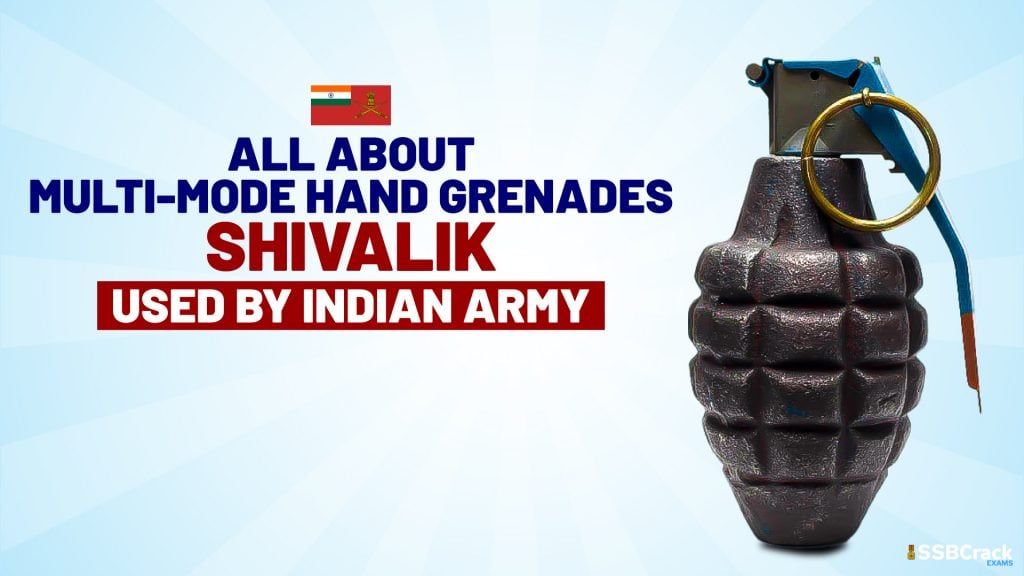The Shivalik grenade is an indigenous grenade to India. It was developed by the Terminal Ballistic Research Laboratory, TBRL, a laboratory of the Defence Research and Development Organization, DRDO, which is located in the foothills of the Shivalik mountains near Chandigarh, and hence, derives its name from here.

Let us understand more about the multi-mode Shivalik hand grenade.
There are four basic types of hand grenades:
- Fragmentation
- Illumination
- Chemical
- Incendiary
The multi-mode hand grenade was developed as a replacement for the vintage hand grenade 36M.
For several years now, the Indian Army has been using the World War vintage 36M hand grenade. The number refers to a variant of the ‘Mills Bomb’ which are British origin grenades, which are also pineapple shaped. These grenades can also be fired from a rifle. The 36M have been manufactured by the facilities of the Ordnance Factory Board, OFB, for the Armed forces.
The most highlighted feature of Shivalik grenade is that it does not explode until the safety pin is removed, unlike the vintage grenade, which could go off accidently.
Also Read: Types Of Grenades And How Does It Work?
The Shivalik grenade offers more in terms of safety, dual mode capability and lethality.
Its twin delay tubes ensure high reliability. Additional safety to the soldier is provided through a minimum 0.5 second arming delay. Further, the grenade has a dual mode capability of a ‘defensive mode’ or an ‘offensive mode’.
The grenades been used by the forces in India till now have mainly been the defensive mode grenades, which means that they are to be hurled when the thrower is in a shelter or has cover, and the target is in an open area and can be harmed by fragmentation.
On the other hand, the offensive grenades do not fragment, and the adversary is harmed by the blast or is stunned while the thrower is safe.

Defensive Mode:
In Defensive Mode, the Grenade is complete as it is assembled with its Fragmenting Sleeve. This mode is used while the soldier is under shelter and the enemy is in the open. Lethal radius is achieved up to 8m from the point of burst.
Offensive Mode:
In Offensive Mode, the Grenade is without its Fragmenting Sleeve and is used for ‘Low Intensity Conflict’ as it offers a stunning effect only. This mode is used while the soldier is in an attack mode. Lethal radius is achieved up to 5m from the point of burst.
Shelf Life:
The shelf life of these grenades is a minimum of fifteen years from the date of manufacture under normal storage and packed condition.
- SSB Interview eBook Pack
- Thematic Apperception Test – TAT
- Lecturette Topics Part-1 eBook [100 Topics]
- Word Association Test – WAT
- Situation Reaction Test – SRT
- Officers Intelligence Test – OIR
Operational Characteristics:
- Delay time -/+ 0.5 Seconds
- Operational temperatures vary from -20 C to +55 C
- Storage temperature ranges from -20 C to +55 C
- Uniform fragmentation pattern
- High lethality
- High reliability (> 95%)
- Safe for para dropping in primed condition
- Maintenance free
The grenade has three basic modules: the fuse, the body and the launcher tube. These different modules can be assembled or dissembled with ease.
This indigenous grenade saves the army approximately INR 200cr every year.
Also Read: First Batch Of Multi-Mode Hand Grenades Handed Over To Indian Army
As seen above, the multi-mode, indigenous hand grenade ‘Shivalik’ is one to reckon with. Its ability to change modes from defensive to offensive and vice-versa is commendable.
The changing of the modes does not affect its capability and lethality in any way.
Being indigenous to India, it also saves the Army crores of rupees every year as the whole manufacturing process is done in India.
The grenade is maintenance free and offers high lethality and reliability in extreme climates.
This Indian grenade is surely one to take into account.
I hope this article was insightful.





